What does Yoast SEO do?

Yoast SEO is a free WordPress SEO plugin that helps your site perform better in search engines like Google. It also gives you the tools to bring your content to the highest SEO and overall readability standards. Here, we’ll explain how our plugin helps you build the best website possible!
Key takeaways
- Yoast SEO is a free WordPress plugin that enhances site performance in search engines and improves content readability.
- The plugin offers tools for optimizing individual posts and pages, focusing on quality content and user experience.
- Yoast SEO provides keyword research integration, readability checks, and SEO title management to help improve rankings.
- For technical SEO, it creates XML sitemaps, manages redirects, and adds structured data automatically.
- Learn SEO while using Yoast with training resources and a user-friendly interface that guides you in optimizing your content.
What Yoast SEO does
Yoast SEO offers many tools and features to boost your SEO. Some of these features influence the SEO of your whole site, while others help you optimize individual posts and pages for search engines.
At Yoast, we believe in our mission, “SEO for everyone,” so you can access all the essential WordPress SEO tools in our free Yoast SEO plugin. But if you really want to boost your SEO, upgrade to Yoast SEO Premium. This upgrade gives you even more amazing SEO features, including great AI features like Yoast AI Optimize and AI Summarize! Keep reading to find out what Yoast SEO can do for your SEO!
SEO for your posts and pages
If you want your posts and pages to appear in the search results, you need to optimize them! So, when you use WordPress to create/edit posts, you’ll find a lot of Yoast SEO tools to help you draft and optimize great content. And if you think SEO optimization is all about keywords, think again. The tools and tips in our Yoast SEO plugins also focus on quality content and user experience. Trust us, because it will all help your rankings, directly or indirectly.
Here’s how the plugins will help you optimize your posts and pages:
Make sure you’re optimizing correctly (we’ll tell you if you aren’t)
After you’ve done your keyword research, you’ll have to start optimizing the pages and posts on your sites for the keywords and keyphrases you want to rank for. To do that, you can set a focus keyphrase for an article in Yoast SEO. Then, the plugin uses our content SEO analyses to determine how your content scores on different factors. It checks how many times you use your keyphrase, the length of your text, or whether you used any internal links.
The results of these analyses guide you in optimizing your post or page to rank with your chosen keyphrase. You’ll see red, orange, and green traffic lights to indicate how every factor scores. This gives you an overview of the overall score and what you can still tackle to increase your rankings!
We also give you tools to find out which keywords you can target successfully, and track how successful your content really is. For the keyword research part, we integrate with the leading online marketing platform, Semrush. For tracking the performance of your content in search, we integrate with the rank tracking platform Wincher.
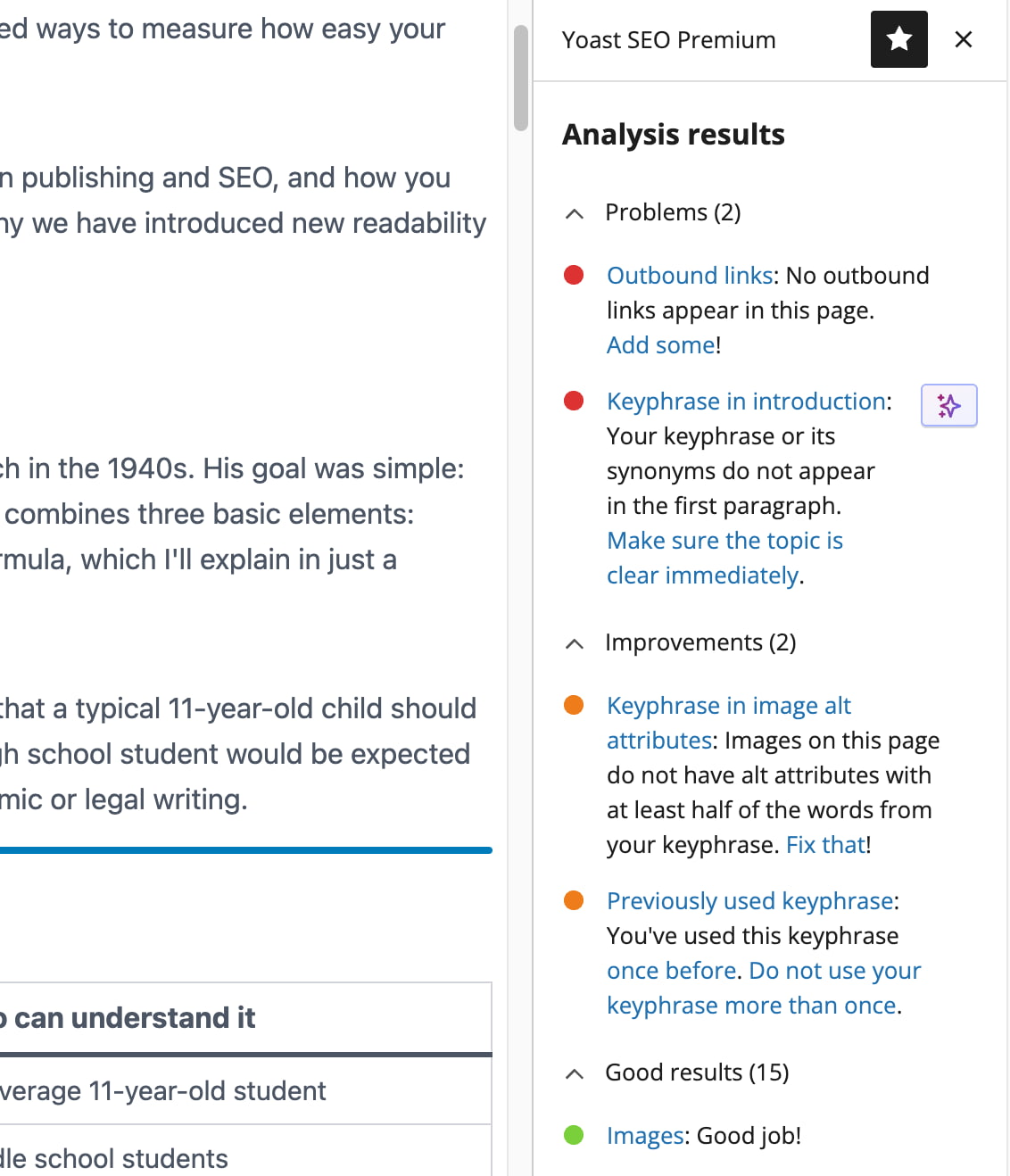
Guidance for writing high-quality content — in many languages!
Optimizing your content to rank with the right keyphrase is important, but don’t forget your reader! Even if you write amazing content for search engines, your audience won’t benefit from it if they don’t understand it. When a person doesn’t understand your content, the chance of them buying something from you is close to zero. The same is true for the odds of them sharing one of your articles with their friends. So, you must ensure your content is also easy to understand. And that’s where the readability features come in.
Our readability checks let you adopt the feedback in a way that suits you, without losing your personal touch. If you’re interested in all the factors that increase readability, you can read more about the Yoast SEO readability features. What’s more, you can optionally enable the inclusive language analysis alongside readability and SEO checks
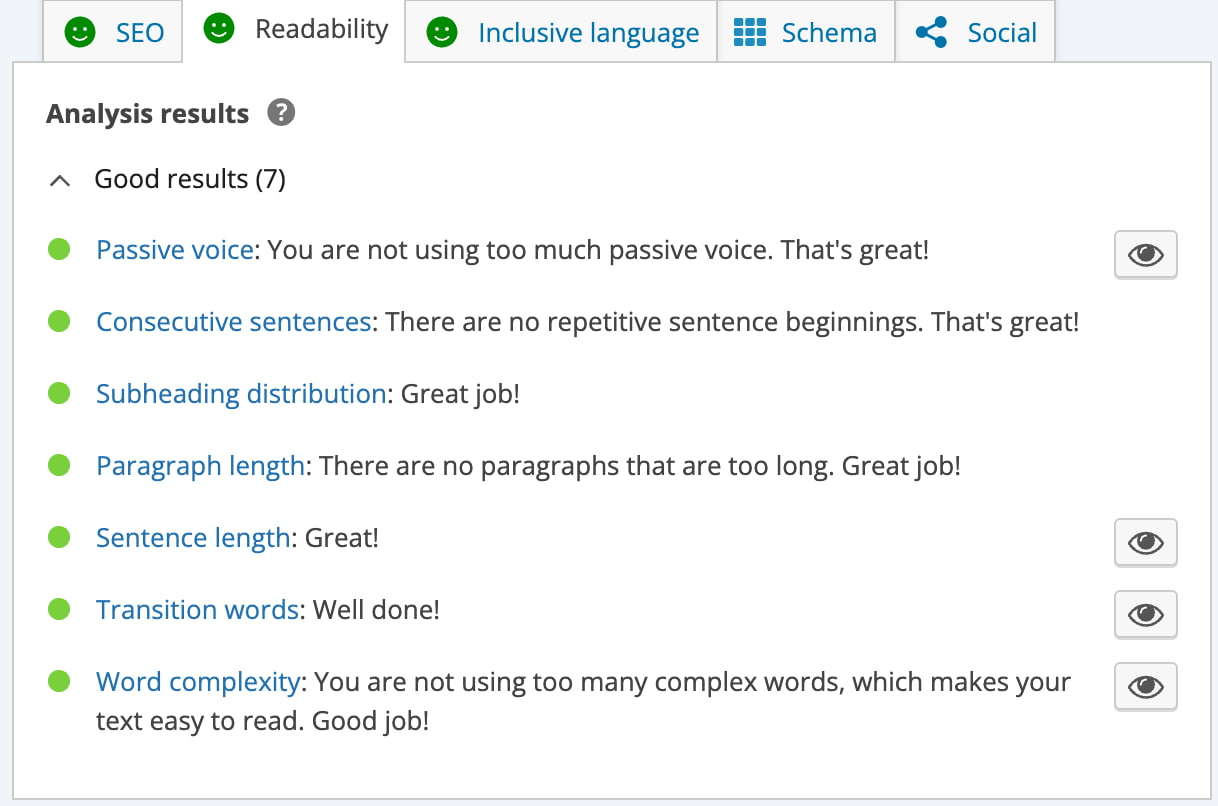
All or most features are available in the following languages: English, German, Dutch, French, Spanish, Italian, Portuguese, Czech, Russian, Polish, Swedish, Hungarian, Indonesian, Arabic, Hebrew, Turkish, Norwegian, Japanese, Slovak, and Greek.* We support more languages at various levels. Check the overview for other languages.
* Unfortunately, it’s not possible to calculate the Flesch reading ease score for some of these languages. Check the overview below to see which languages.
Based on years of research
Yoast SEO’s readability features are well-researched analyses that give you feedback on how to optimize your writing. Now, this may sound strange, because the way you write can be very personal. Let us explain how it works.
The plugin uses an algorithm to check your content for factors that are proven to increase readability. We look at the use of transition words, the use of passive voice, sentence and paragraph lengths, word complexity, and more. However, we carefully crafted this algorithm to be as accurate as possible without being too strict.
Influence what Google shows in search results
Of course, you don’t just want your pages to appear in Google’s search results. You want your search results to look amazing, too! That’s why Yoast SEO has tools to let you plan and preview how each page will (probably) look when it appears on Google. This is probably something we can’t avoid here, as Google will occasionally decide it knows better and show something else instead. But by optimizing certain outputs on your page, you can indicate how Google should present your content to users. And that’s still something worth doing.
Titles and meta descriptions
With our plugin, you can specify an SEO title (the ‘headline’ of your search result) and a meta description (a short piece of text underneath your search headline, describing what users can find on your page) for each new page you publish. We’ll let you know if these are too long or if your keyword is missing. If you want to, you can also set defaults for all your pages.
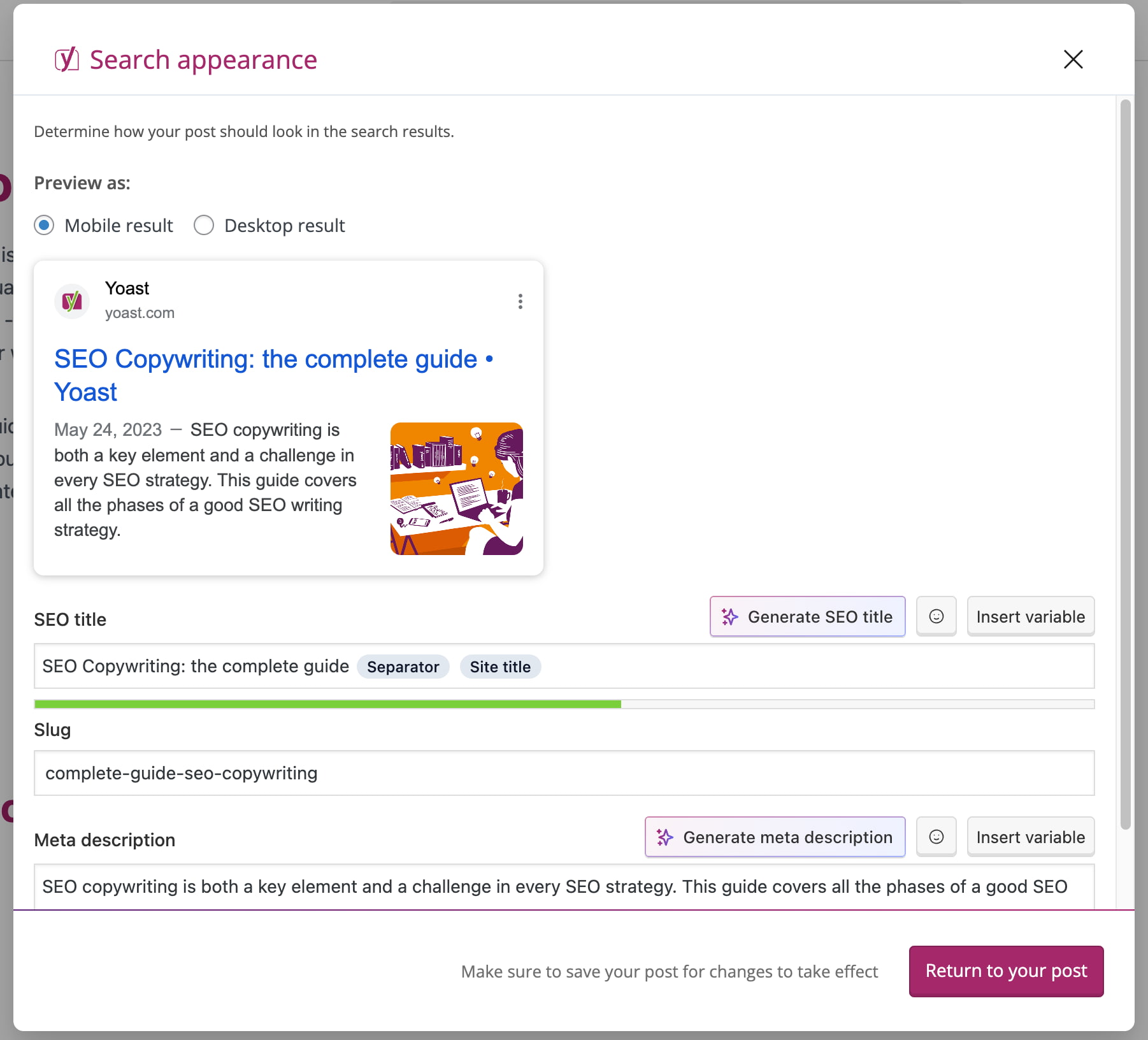
You might have seen search results that contain extra parts beyond the usual headline-and-description format before. The example below contains recipes with extra information like reviews, cooking time, ingredients, and images, for instance. And that’s just one example. Extra information can be added for all kinds of results, including products!
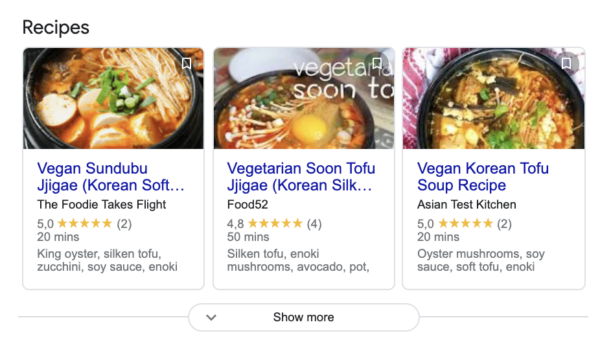
The way to get results like this is by using Schema structured data. We won’t lie: it’s complex, technical stuff. Luckily for you, you won’t need to know a thing about the tech wizardry behind it. Just having Yoast SEO installed means you’ll automatically have structured data output for your pages. All you need to do is select a few options to make sure it suits your needs.
Manage social outputs
Now, social media isn’t strictly a part of SEO. But when you make great content, you often want to share that content on your social feeds, too. That’s why Yoast SEO also comes with Facebook and X previews that you can adjust to make sure your content is always looking great, whoever is sharing it. You can set a specific title, description and OpenGraph image for each post. Again, if you prefer to set one standard structure for all posts, there’s an option to do that.
Technical SEO for your website
We’ve taken a look at what Yoast SEO can do for your posts and pages. But what can it do for your site overall? If technical SEO isn’t your strong suit, much of the following may not make sense to you. But don’t worry! Yoast SEO exists to make sure you don’t have to know all of these things.
Set up your site for SEO
The plugin settings are very sensible by default, and our first-time configuration also guides you through the steps to get your technical SEO settings right. Behind the scenes, our hidden features will also gear you up with an XML sitemap, a robots.txt file, site-level Schema structured data, and more.
The free version of Yoast SEO automatically generates XML sitemaps for your website, making it easier for search engines like Google to find and index your content. These sitemaps update on their own whenever you add or remove pages, so you don’t have to do any manual work. In addition, Yoast SEO gives you easy access to your site’s robots.txt file. From the plugin, you can view or edit this file to control which parts of your site search engines are allowed to crawl. Both features help search engines discover your content while giving you more control over your site’s visibility.
Thanks to Yoast SEO, you can now quickly and without additional cost add an llms.txt file to your site to guide AI systems toward your most valuable content. This simple text file helps AI tools identify and prioritize key pages efficiently, ensuring they focus on what matters most to your site.
Manage your content
As you write more and more content for your site, you’ll be looking for easy ways to manage it! The Yoast SEO plugin comes with a few features to help you manage your content well and avoid common SEO issues. For instance, when you make changes like deleting a page or changing a URL, if you don’t know what you’re doing, then things can get messy. And if you make a lot of similar pages, that can be a problem too, as Google doesn’t know which one it should direct users towards. To help you deal with SEO issues like these, Yoast SEO comes with two unmissable tools: canonical URL tags and the Redirects tool.
Canonical URLs
Canonical URLs are really helpful if you have a lot of similar content, such as a webshop with multiple variants of the same product, each having its own page. To make life easy for you, Yoast SEO automatically adds canonical tags to all content marked for indexing. All of the canonical tags will be taken care of in the background; in most cases, you won’t need to change a thing. If you do need to adjust your canonical URL tags, it’s easy to do so.
Managing redirects
Redirects are essential if you’re moving or removing content. The fact is, users will probably still find their way to the old URL, but the content they’re expecting won’t be there. That’s not only disappointing and frustrating for users, but it can also make it harder for Google to find and index your content, too. While advanced redirect management is part of Yoast SEO Premium, you can still handle basic changes using WordPress settings or other free plugins.
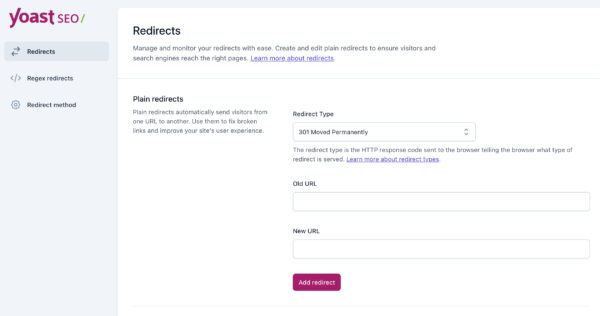
Build your site structure and internal links
If you want findable content that really ranks, you need to take care of your site structure and internal linking. The Yoast SEO plugin comes with a few tools to help you manage how your content links together: there’s a text link counter, which will tell you how many incoming and outgoing internal links there are on a page, as well as an internal linking suggestions tool in Yoast SEO Premium (in the editor view), which can help you add more if necessary. These features help you build a strong site structure and make sure your important content is easy for visitors and search engines to find.
Even more technical features of Yoast SEO
By simply installing the plugin and following the steps in our configuration workout, you’re already fixing a lot of important technical SEO things for your site! We do these steps for you, so you don’t have to know about every little technical detail.
If you really want to know everything Yoast SEO can do for you, then take a look at the complete list of features. Additionally, if you are (a bit more) familiar with technical SEO, you might enjoy reading more about Yoast SEO’s hidden features that secretly level up your SEO!
Read more: Things we don’t do in Yoast SEO and why »
Learn SEO by doing SEO with Yoast
Still need to learn about SEO? One of the biggest benefits of using the Yoast plugins is that they make it really easy to get started and learn as you go along! We’ll give you pointers to help you get everything right, as well as links to read more about how SEO works and how to do it.
If you want to keep learning about SEO, we also offer free training courses and resources in our Yoast SEO Academy and on our SEO blog. You can start with these basics to understand how SEO works and get more out of your website as you go.
A quick recap
In this article, we’ve shown you what Yoast SEO can do for your site. Our plugin helps you improve your content SEO by helping you set a keyphrase and telling you exactly how you can optimize your content to rank with this keyphrase. The plugin also helps you improve the readability of your content by providing feedback that you can easily incorporate into your own writing style. And last but not least, the Yoast plugin improves your technical SEO by taking care of a lot of technical things in the background.
Everything above is available in Yoast SEO’s free plugin, making it a great starting point for most WordPress users. If you ever want more advanced tools, you can always explore Yoast SEO Premium and its extra features.

